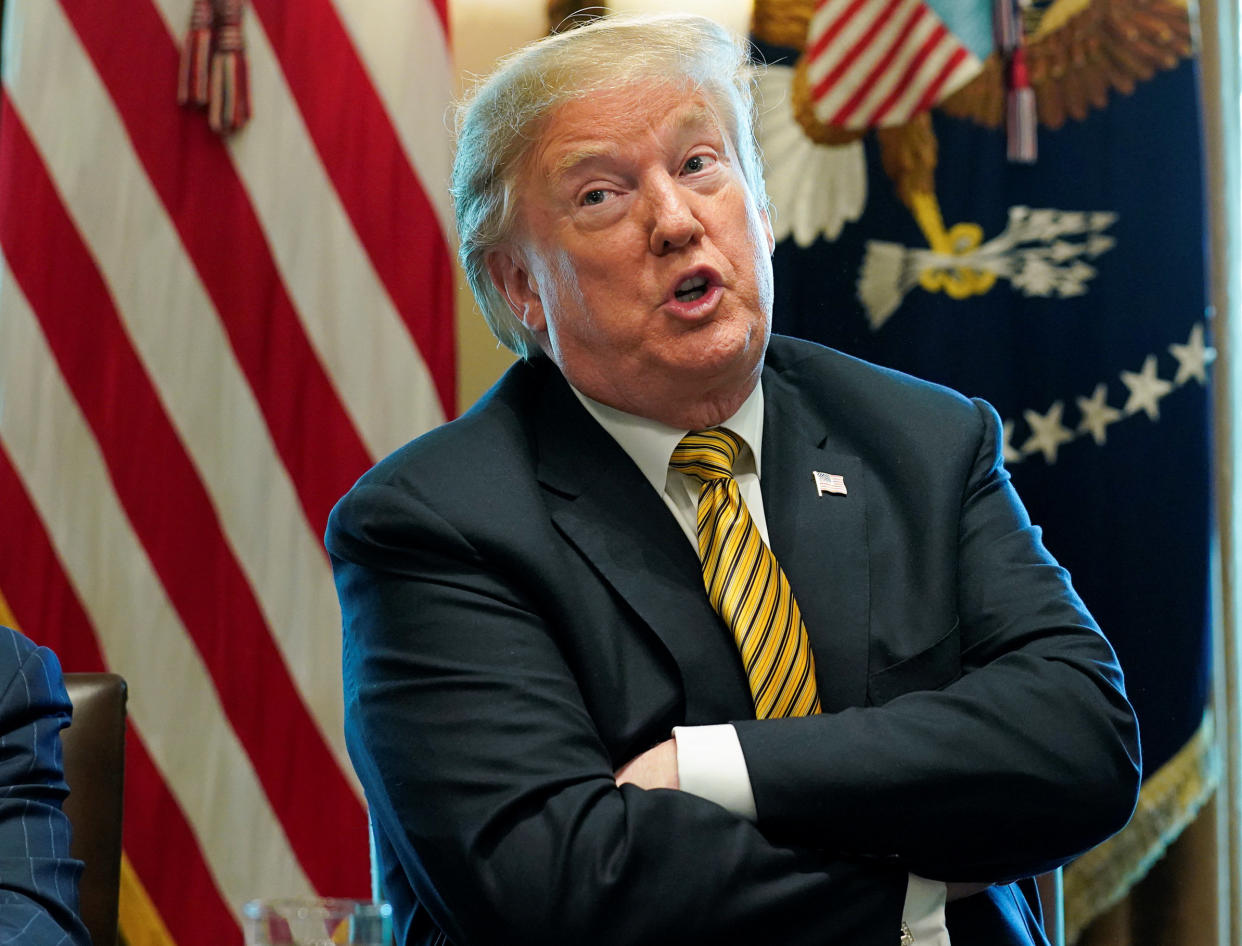Trump Dispenses Another Round Of Policy Whiplash With Border Closing Reversal

WASHINGTON — Donald Trump was going to withdraw all U.S. troops from Syria. Right up until he wasn’t.
He was going to push through a new health care law. Until a few days later, he wasn’t.
On Thursday, his threat to shut down the Mexican border became the latest episode of presidential whiplash, as Trump offered a rambling and confusing explanation that instead of closing the border this week he will impose new tariffs — a year from now, possibly followed by a border closure, if Mexico doesn’t shape up.
“We’re going to give them a one-year warning and if the drugs don’t stop or largely stop, we’re going to put tariffs on Mexico and products, particularly cars. The whole ballgame is cars. It’s the big ballgame. With many countries it is cars. And if that doesn’t stop the drugs, we close the border,” Trump said during a White House photo opportunity.
He soon added that he would also put tariffs on Mexican-built cars if Mexico fails to halt the flow of illegal immigrants: “And if they don’t do it, we’re going to tax the cars and if that doesn’t work, we’re going to close the border.”
Last Friday, Trump had said: “There’s a very good likelihood that I’ll be closing the border next week.” Just Wednesday, less than 48 hours before his reversal, he had said shutting the border was imminent. “I’m ready to close it, if I have to close it,” he said.
The White House did not respond to HuffPost queries as to what, precisely, the president meant and why he was repeatedly putting forth policies only to change course on them soon afterward.
Monica deBolle, a trade expert at the Peterson Institute for International Economics, said she no longer tries to understand Trump’s words or motivations. “I don’t think it matters anymore,” she said. “But the reversal on the border means that at least that won’t be the issue derailing the economy.”
In each of the recent policy reversals, experts both inside and outside of government had to persuade Trump that what he was proposing was a bad idea. With Syria, officials from the Defense Department and State Department explained that a sudden and complete withdrawal from Syria, as Trump had ordered in December, could undo much of the work of retaking territory that had been controlled by the Islamic State terror group. The timetable for withdrawal was stretched out over many months, and at least 400 of the original 2,000 troops will remain.
Similarly, Trump decided to talk up replacing the Affordable Care Act in response to media coverage of his administration’s new legal effort to get the law overturned entirely, which would take health care coverage away from tens of millions of Americans.
“The Republican Party will soon be known as the party of health care,” he said last week — but then quickly reversed himself after Senate Majority Leader Mitch McConnell said he had no interest in reprising that fight. On Monday, Trump wrote on Twitter that the new plan would be drawn up in the coming year and a half: “Vote will be taken right after the Election when Republicans hold the Senate & win back the House.”
And on the matter of the border, Trump was irritated by the rising number of border crossings by Central American asylum seekers and demanded that Mexico do more to stop it from happening or that he would close the border, possibly to all traffic. American business groups, including auto manufacturers and farmers, warned that doing so would devastate them and, in turn, tank the entire economy — a message that Trump’s economic advisers appear to have successfully sold.
Trump, of course, has not always reversed himself because of pressure from fellow Republicans. He was advised not to force a government shutdown in December, but did so anyway as a way to force Congress to provide funding for a border wall that he originally promised Mexico would pay for. The 35-day shutdown ultimately ended after air traffic controllers calling in sick dramatically slowed operations at LaGuardia, Trump’s home airport in New York City. Trump did not get any money for his wall.
He was also advised not to declare a national emergency to raid money appropriated by Congress to the Defense Department for military base construction projects. He did that, as well, and wound up signing his very first veto on legislation that would have ended that emergency. His emergency declaration remains the subject of numerous lawsuits.
Also on HuffPost
Love HuffPost? Become a founding member of HuffPost Plus today.
This article originally appeared on HuffPost.

